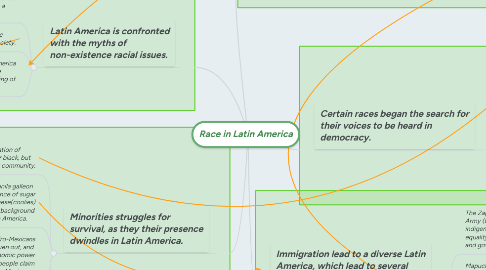
1. Minorities struggles for survival, as they their presence dwindles in Latin America.
1.1. In Brazil, there was a continuation of segregation: no education for black, but many prisons full of the black community.
1.2. After Spain's Manila galleon trade and existence of sugar plantations Chinese(coolies) and other Asian background traveled to Latin America.
1.2.1. Today Koreans struggle while living in Latin America (mostly Mexico), ex. Tepitos wanting to drive out Korean stores.
1.3. In Mexico, Afro-Mexicans are being driven out, and have no economic power those these people claim themselves as Mexicans more than anything.
1.3.1. Yanga, on Mexico’s Gulf Coast is a sleepy pueblito founded by a slave now has no Afro-Mexican families because they were driven out.
1.4. Indigenous communities are being driven out of their land and slowly decreasing in numbers while water plantation dry out the land they hold.
2. Latin America is confronted with the myths of non-existence racial issues.
2.1. Scholars in brazil wanted to portray themselves as a non-racist society.
2.1.1. There was a belief that the problems in Brazil ws due to the difference in class not race.
2.2. Mexico ignores the fact that they are Afro-Mexicans that exists in their society.
2.3. The media in Latin America was a huge role in the development and hiding of racial issues.
3. Immigration lead to a diverse Latin America, which lead to several movements.
3.1. The Zapatista National Liberation Army (EZLN) is a movement made by indigenous people in order to obtain equality like healthcare, education, and governmet.
3.1.1. they reclaim land for those who work it, access to education and health care, to democracy, to justice liberty and dignity for all
3.2. Mapuche Protest Outside UNICEF Office to protest police violence against Mapuche children in rural communities, and opposed to hydro-electric development in their territories as well policies around land and forestry.
3.3. Development of the ideology of Cimarronismo by organization Cimarron.
4. Certain races began the search for their voices to be heard in democracy.
4.1. In Brazil there was the pioneering of UNESCO which research the history of Africans, fund organizations, and develop ways for equality.
4.1.1. Though Africans of different desendents developed new ways for equality there is still a need for more equality today.
4.2. Newspaper like Negria Presencia became a voice for the black community.
4.3. In Columbia the mobilization of blacks aroused issues like human rights and racial discrimination which led to political and constitutional reform.
5. Organizations began to develop in order to create change for the various races in Latin America.
5.1. Blacks in Brazil and Mexcio began to develop organizations to not only fight for their equality but to show the inequality they still face today.
5.1.1. The Center for the Investigation and Development of Black Culture, and Cimarron.
5.2. The Zapatistas (a group of indigenous people) used the media and their efforts to show their struggles.
5.2.1. This began as a mistrust with Mexico government and they're non-existent representation.
